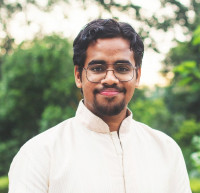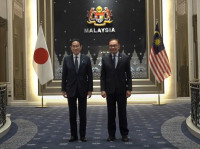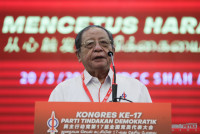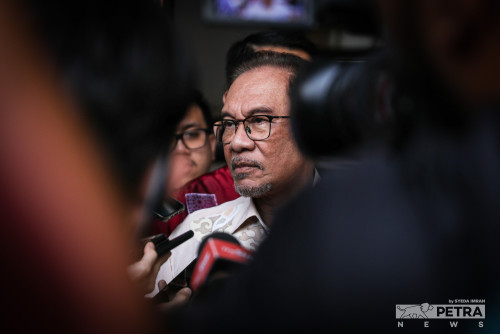THIS year marks 65 years since Malaysia established diplomatic relations with Japan. It coincides with the 40th anniversary since the “Look East” policy was established under Mahathir’s administration, which remains in place today.
First announced in December 1981, the Look East policy was a strategic ancillary move taken by Mahathir to protest British products and imports. A nationwide campaign, “Buy British Last”, was launched during the same period when bilateral relations between the countries were strained.
Despite the initial backdrop behind the policy’s introduction being purely motivated by economic pressures, it revived an international interest for Asian countries to be more self-reliant and independent of Western hegemony.
Ten years after it was first announced, India introduced a similar policy. For Malaysia, the spirit behind this policy grew to not merely strengthen its economic position but also inculcate the values and ethics of Japanese society.
The Bon Odori festival, first organised in 1977, functioned as an important marker to bolster bilateral relations with Japan. Mahathir’s introduction of the Look East policy in 1981 revived further interest in Japanese culture, and the Bon Odori festival began to take on a greater emphasis.
It remains the only major Japanese festival celebrated in the country. With ties to Shinto and Buddhism, Japan’s two major religions, this festival is often attributed as a commemoration of one’s ancestors.
“Bon Odori” is the dance performed to welcome the spirits of the dead, similar to the Hungry Ghost festival celebrated by the Chinese community in Malaysia. However, its religious and spiritual connotations have been muted over the centuries with the advent of modernity.
Now, it is mostly a festival for family and friends to gather and celebrate Japanese folk culture. The festival regularly attracts 35,000 people annually and in 2019 made the Guinness Records for the largest participation in a Bon Odori dance performance.
Recent comments by religious leaders threaten the prosperous relationship Malaysia has shared with Japan and could give rise to anti-Japanese sentiments among more conservative quarters.
Malaysia is a multicultural society and that means that all people, regardless of ethnicity and religion can participate in major festivals observed in the country. The festivals of Christmas and Deepavali also have religious origins, but they have taken on a more secular character to accommodate people of all beliefs.
The Vibes interviewed Malaysians and members of the Japanese diaspora in Malaysia on what the Bon Odori festival means to them. The following anecdotes have been edited for length and clarity.
Dexter Yin Yu Wen, 33 years old
“I have been to Japan before for a year-long student exchange programme. I studied in one of the high schools located in Nagasaki, Japan. Throughout the programme, I lived with a Japanese foster family and received the same treatment as other Japanese students did.
"Bon Odori is a festival where people commemorate and honour their ancestors. Nowadays, people attend as part of a gathering among friends and family. I attended my first Bon Odori in Kuala Lumpur when I was 13 years old.
"I travelled from Melaka with my other Japanese classmates. I was mesmerised by the festival as I had not been to Japan then. I felt as if I was in Japan, especially with the Japanese people wearing their traditional clothing like the yukata.
"They served Japanese food which I had not seen before in any Japanese restaurants. There is a rectangular wooden stage in the centre of the field called a yagura and it would be surrounded by many lanterns.
"When the festival starts, the participants would dance in a circle along the rectangular wooden stage. This would be accompanied by the tune of folk songs and the sound of the taiko, a traditional Japanese drum.
"I wish that Malaysians would understand this as part of globalisation. It is important to respect the differences in culture and understand instead of ridiculing them.”
_at_the_Bon_Odori_festival_in_(2017)_(Komplex_Sukan_Negara_Shah_Alam__Panasonic).jpg)
Nozomi
“I'm Japanese and was born and raised in Tohoku, a region rich in cultural heritage. I am back in Japan now, but I have lived in Malaysia for over 10 years when I was 22 years old. I would like to live in Malaysia again someday.
"Living in Malaysia made me think about religions in a way that I had never been aware of before. I have only participated in Bon Odori in Malaysia as there was no culture in my hometown. Even in Japan, there are only a few places where the culture of Bon Odori remains.
"It is rare to have the festival on a large scale as in Malaysia. I have participated many times in Malaysia, but I can never forget the glittering smile of my son when I took him there for the first time.”
_at_the_2016_Bon_Odori_festival_in_Shah_Alam__Selangor..jpg)
Sari Miyata, 43 years old
“I have lived in Malaysia for the past 18 years. I moved here after living in the United States for 6 years, so most of my life has been spent outside of Japan. However, I feel comfortable in Malaysia.
"My earliest memory of celebrating the Bon Odori festival was when I was 5 or 6. I remember I wore a yukata and it felt like a summer festival. My favourite part of the festival as a child was playing the games organised and visiting the various food stalls.”
Kazuchika, 38 years old
“I was born and raised in Japan. I moved to Kuala Lumpur in 2015 and stayed until 2020. I returned this March, and I will be here for another three years. My favourite part of the Bon Odori festival is the fireworks at the end and looking for tasty street food with family members.
"I have always felt that Malaysians respect Japanese culture, and they do their best to understand us. I could not ask for more. Malaysia is more flexible than Japan when dealing with issues of diversity. Every race respects each other and this is the best country for Japanese to learn to live in a multicultural society.”
Akiko Nishio, 47 years old
“I have lived in Malaysia for 23 years and I feel at home in this country. I am a principal of a Japanese language centre in Malaysia. We not only teach the Japanese language, but also its culture.
"I am also the chief of the World Association of Overseas Japanese Entrepreneurs (Waoje) in Kuala Lumpur. It is a small community but there is good teamwork. We give advice and exchange information with each other.
"Even though there is a lack of support from Malaysia and Japan, we try to survive because we like living in Malaysia. My memory of the Bon Odori festival is how crowded it is. It is interesting because the dancers run when they dance while in Japan, it is normally slower and calmer.” – The Vibes, June 15, 2022



_with_friends_at_the_2016_Bon_Odori_festival_in_Shah_Alam__Selangor..jpg)


_Summit_in_Tokyo._Facebook-PMO_Malaysia_pic..png)












.jpg)

